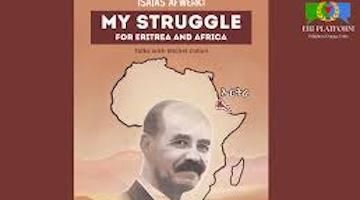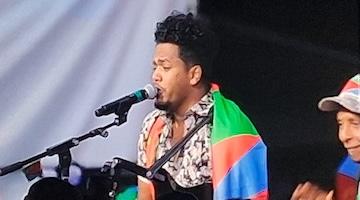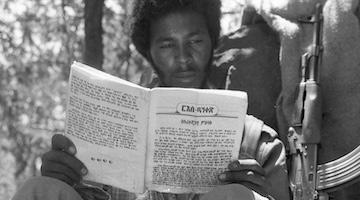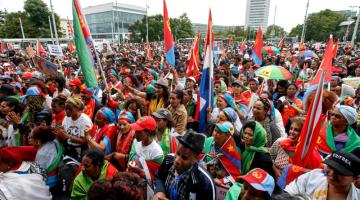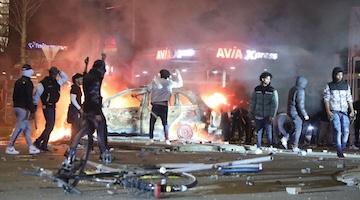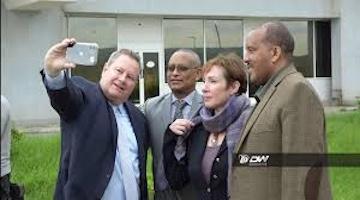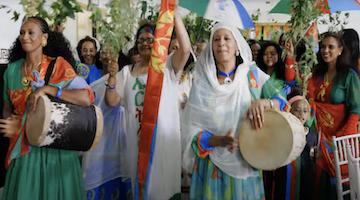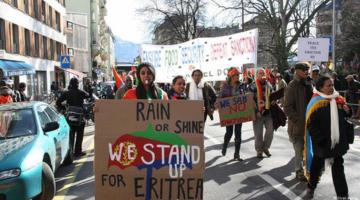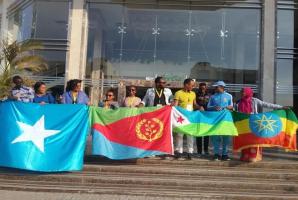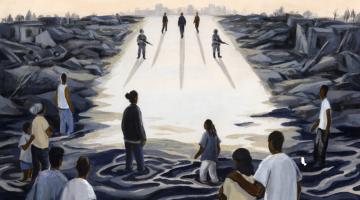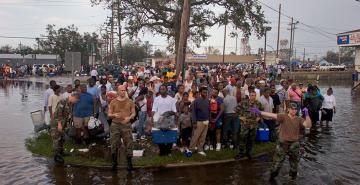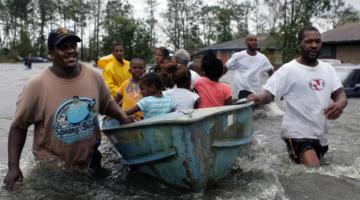The US bid for sanctions against Eritrea was rebuked by the UN Security Council, so the imperial bloc had to settle for European sanctions against the fiercely independent African government.
“The peace between Eritrea and Ethiopia, moving forward, is now unbreakable.”
The European Union (EU) came out “screaming on the Internet” this week with all-caps, boldface typography in a video cloaking its latest imperial moves in comically phony human rights sanctimony:
“The EU SANCTIONS 11 individuals responsible for the recent MILITARY COUP IN MYANMAR and the ensuing POLICE AND MILITARY OPPRESSION against peaceful demonstrators. The SANCTIONS include a TRAVEL BAN and an ASSET FREEZE. The EU also sanctions more individuals over SERIOUS VIOLATIONS of HUMAN RIGHTS in CHINA over the persecution of the Uyghurs in NORTH KOREA, in LIBYA, in SOUTH SUDAN and ERITREA, in RUSSIA over the REPRESSION OF LGBTI PEOPLE. Together with the sanctions against FOUR RUSSIANS responsible for arbitrary DETENTIONS AND REPRESSION of freedom of peaceful assembly. These decisions represent the EU’s DETERMINATION to stand up for HUMAN RIGHTS.”
I’m sure Black Agenda Report readers need no deconstruction of this preposterous, typographically juvenile posturing, so let’s move on to the sanctions on Eritrea. Following up on my interview last week with Eritrean American blogger and activist Filmon Zerai, I spoke to Eritrean American doctor and activist Simon Tesfa-Mariam about the sanctions and the conflict between Ethiopia’s central government and its Tigray regional government.
Ann Garrison: Simon, what are your thoughts about the new EU sanctions on Eritrea?
Simon Tesfa-Mariam: The EU sanctions are part of a longstanding effort to isolate and vilify Eritrea for its independent political stance. Eritrea has played a stabilizing role in the region, which is highlighted by Ethiopian Prime Minister Abiy Ahmed’s comments in parliament today. The US, seeking to drive a wedge between Eritrea and Ethiopia to keep the region subservient to Washington—as it was when the TPLF ruled Ethiopia—pushed for multilateral sanctions via the UN Security Council. China, Russia and India challenged them on the grounds that they’d be meddling in the internal affairs of sovereign nations, and China and Russia of course have veto power. Reeling from this failure and embarrassment, the US then pushed the EU to pursue unilateral sanctions to punish Eritrea.
AG: I noted that these new EU sanctions have nothing to do with Tigray. They’re all about punishing Eritrea’s government for human rights abuse of Eritrean citizens, and of course they fail to mention that Eritrea is the last African nation refusing to collaborate with the US Africa Command (AFRICOM).
ST: Whereas the UN sanctions were focused on Eritrea’s alleged war crimes in Tigray, the sanctions by the EU instead cited “human rights violations in Eritrea.” That’s because they were unable to come up with any evidentiary support for claims of Eritrean crimes in Tigray.
What are these human rights allegedly abused inside Eritrea? In January, High Representative of the EU for Foreign Affairs and Security Policy Josep Borrell mandated the Minister for Foreign Affairs Pekka Haavisto to travel to the Horn of Africa to assess the situation in Ethiopia and neighboring countries in order find a peaceful solution to the Tigray conflict. But Haavisto never even visited Eritrea, which is odd given the EU’s allegations of Eritrean involvement in the Tigrayan conflict. Hence, Haavisto was not on a fact-finding mission seeking genuine solutions or truth, but was instead on a performative visit to provide support for sanctions against Eritrea that the EU had already been decided to impose.
The sanctions target Eritrea’s National Security Agency, which is led by the former freedom fighter Abraha Kassa. Again, the sanctions seek to isolate and vilify Eritrea rather than actually target Abraha Kassa, who has no assets in the EU and does not travel there. Targeting the entire office with broad, non-specific language suggests that these are far from “targeted” sanctions. The sanctions could be expanded to block anything, with the assumption being that some given thing is part of national security. The EU should be ashamed by this latest round of unjustifiable sanctions and the lack of media coverage suggests that they are. I find it odd that the EU sanctions were not reported in the media. Only the AP reported on Eritrea's response to the sanctions rather than the EU’s decision to impose them. [Eritrea says EU sanctions on security agency are ‘malicious.’]
Here’s the actual text from the EU:
"The National Security Office (a.k.a. National Security Agency) of the Government of Eritrea is headed by Major General Abraha Kassa and is under the supervision of the Office of the President. The National Security Office is organized into six offices, each of which is divided into three sections responsible for intelligence, arrests, and interrogations, respectively. The National Security Office is responsible for serious human rights violations in Eritrea, in particular arbitrary arrests, extrajudicial killings, enforced disappearances of persons and torture committed by its agents."
AG: So they’re saying that Eritrea, particularly in the person of this intelligence chief supervised by the president, is guilty of the same crimes the US has committed at Guantanamo, Abu Ghraib, Bagram Air Base and much of the rest of the Middle East and Central Asia since 9/11, or one might say, since the beginning of the US empire?
ST: They didn’t mention those, of course. The hypocrisy is not lost on the Eritrean people who are hyper-aware of the crimes of the US around the world.
AG: The US Ambassador to the UN, whoever it is, never votes for the UN Resolution Condemning Extrajudicial, Summary, and Arbitrary Execution that comes up for a vote every few years. It’s just a “consensus” resolution” without any teeth, but the UN Rapporteur on Torture has pointed out that it could someday be cited in a court of international law, where a “yes” vote could cause the US problems regarding torture, drone bombing, and the racist implementation of the death penalty in the American South, none of which have triggered any EU sanctions. In 2010, UN Ambassador Susan Rice lobbied heavily for including LGBTQI in the classes of people the resolution aims to protect, but then voted against it, as the US always does, despite her success.
ST: You don’t expect me to be surprised, do you?
AG: No, it’s just part of my job to add a few contextual notes like that as we go. Did the previous sanctions, the ones that Trump lifted in 2019, punish the Eritrean people?
ST: Yes, they did. Although those sanctions were explicitly just an arms embargo, they were used to prevent Eritrea from acquiring necessary goods from the international market and stymie business and investment in Eritrea. For example, Eritrea couldn't get computer servers from the EU, with the reason given being that they could be used as military hardware. The same went for ambulances, spare parts for generators to power the national grid, etc. The sanctions were really an assault on the Eritrean people.
Eritrean businesses have had difficulty opening bank accounts in the West. In America, the Treasury Department included Eritrea in the Office of Foreign Assets Control (OFAC)’s list of countries/entities that were banned or considered risky business, so banks in the US and Canada also opted not to open Eritrean accounts, saying the financial risks would be too high for them. This basically made it difficult for the West to do business with Eritrea.
The sanctions merely provided cover for actions that had already been taken for years behind closed doors. Actions taken against the development of Eritrean mining serve as a perfect of example of this. Wikileaks cables prove that Americans, Germans and other Europeans were working hard to crush Eritrea’s nascent mining industry:
EUROPEANS TRACK U.S. ON EAST AFRICA BUT REMAIN RELUCTANT TO SANCTION ERITREA
FINANCING MINERAL EXTRACTION IN ERITREA: WHO WILL PAY?
ERITREA: GERMAN BANKS BAILING ON BISHA?
Here are a few highlights from those Wikileaks:
"The German government extended a credit guarantee to a consortium of mostly German banks for a commercial loan of $146m to Eritrea's Bisha mining project (REF A). The exact terms of this credit guarantee are not clear, but it likely contained the sort of political risk insurance offered by OPIC to American investors abroad. Following up on initial information that the German government has pulled the plug on this credit guarantee (REF B), Post was told by an Asmara-based European diplomat that ‘a German Secretary of State for Foreign Affairs’ has revisited the credit guarantee and recommended that it be rescinded due to Eritrea's spoiler role in the Horn of Africa and potential UN or AU sanctions. When the German ambassador to Eritrea was asked about this recently, his curt reply was, ‘That's secret.’ The European diplomat said the German ambassador is extremely upset with Berlin for caving in to what he sees as American pressure and is considering resigning.’"
"Whether to engage or isolate Eritrea as a spoiler was what the quint group addressed. Germany reported not being encouraged by its efforts to engage
with Eritrea and noted that the German government had decided to freeze its support for the Bisha mining project, which he predicted would paralyze the project."
These Wikileaks cables highlight how sanctions were used as part of a broader strategy to "isolate Eritrea and wait for it to implode economically" (quote from another Wikileaks cable). They show how America was pressuring banks worldwide to stop doing business with Eritrea and to pull back from supporting the Bisha mining project because "the regime has refused to take the reformist medicine prescribed by the IMF and World Bank, believing it can limp ahead to the date when Bisha comes on line."
AG: Very interesting. Thanks for that.
ST: That's why the 2019 visit by US Treasury officials to Eritrea was an important development. America could begin to repair the damage that it had needlessly caused by the sanctions of successive US administrations. However, this was under Trump, who had a more hands-off approach with Africa, unlike Biden, whose foreign policy is quietly led from the shadows by Susan Rice.
AG: That’s when they lifted the sanctions Susan Rice had worked to impose in 2009 and 2011, and things got some better after that, right? Even though these were Trump’s Treasury officials?
ST: Yes. It’s worth mentioning that US sanctions on Eritrea actually date back to 2004—unilateral sanctions—when Eritrea was placed under the list of Countries of Particular Concern by the Bush administration. This, again, suggests that this is part of longstanding US strategy to isolate Eritrea. Trump shook things up for a bit but we shouldn’t be surprised that the US state has reverted back to its old established ways.
AG: I want to come back to the “targeted” nature of the sanctions. So, the Euro charade is that they’re just sanctioning one office that abuses Eritrean citizens’ human rights, but Eritreans are likely to feel the pain eventually.
ST: Objectively speaking, yes. However, it's important to note that Eritrea is in a much stronger diplomatic and economic position than it was in when the last round of sanctions were enacted by the UN (in 2009 and then 2011). The Tigrayan People’s Liberation Front (TPLF) can no longer isolate Eritrea regionally and in Africa since they no longer control the Intergovernmental Authority on Development (IGAD) for Djibouti, Eritrea, Ethiopia, Kenya, Somalia, South Sudan, Sudan and Uganda, and they have little influence in the African Union.
Look at how Africans are on Eritrea's side in this conflict.
AG: I saw that the African Union resisted US pressure to intervene in Ethiopia’s civil war in Tigray, issuing a formal statement that the central Ethiopian government had taken “legitimate” military action in its Tigray province to preserve the country's unity and stability. The African Union also resisted US and EU pressure to intervene in Burundi in 2015 and 2016, saying that an “intervention” would in fact be an “invasion.”
ST: Yes, and look at how Ethiopians and Eritreans are demonstrating support for each other in the diaspora and on social media.
AG: I have noted that Ethiopians and Eritreans are demonstrating together in support of both their countries outside Western embassies, legislatures, and the like.
ST: The peace between Eritrea and Ethiopia, moving forward, is now unbreakable. The border with Ethiopia will soon reopen, given that TPLF is now defeated (albeit their remnants still exist in Tigray). And we are now living in a multi-polar world where countries like China and Russia provide alternatives to US/EU hegemony. Eritrea is not dependent on Western institutions like the IMF and World Bank and has been able to finance its development without the West. Lastly, the Eritrean people—united at home and abroad—are resilient and have already demonstrated an ability to defeat sanctions despite them causing momentary "pain" and unnecessary suffering. For these reasons, the sanctions will do little to stop the march of Eritrean development.
It's also important to show how every time US Secretary of State Blinken pressures or "urges" Abiy to move away from Eritrea or pushes non-existent Eritrean troops to leave Tigray, Abiy comes back in full opposition by re-professing his gratitude to Eritrea for supporting Ethiopia in its "darkest hours" and making sure to remind foreign countries that they will not bow to pressure and intimidation. This is huge. This is not just Abiy but a manifestation of broader feeling among the Ethiopian masses, who have needlessly suffered for having been kept separated from the Eritrean people by TPLF.
AG: And separated from the Red Sea as well? Since Ethiopia is landlocked, I imagine that regained access to the Red Sea via Eritrea is important economically.
ST: Before the 1998 war, when relations with Ethiopia were good, Eritrea offered Ethiopia use of its ports free of tax. The sky was the limit in terms of use of Eritrean ports. There's no reason to think that Eritrea can't return to a similar arrangement.
Dr. Simon Tesfa-Mariam is an Eritrean American medical doctor and activist. In 2013, Black Agenda Report published his essay “Human Trafficking and the Human Rights Agenda Against Eritrea.
Ann Garrison is an independent journalist based in the San Francisco Bay Area. In 2014, she received the Victoire Ingabire Umuhoza Democracy and Peace Prize for promoting peace through her reporting on conflict in the African Great Lakes Region. Please help support her work on Patreon. She can be reached on Twitter @AnnGarrison and at ann(at)anngarrison(dot)com.
COMMENTS?
Please join the conversation on Black Agenda Report's Facebook page at http://facebook.com/blackagendareport
Or, you can comment by emailing us at comments@blackagendareport.com

